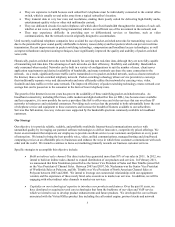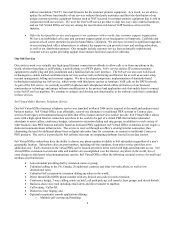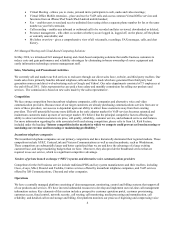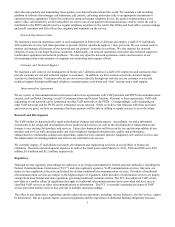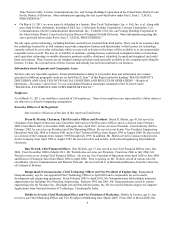8x8 2011 Annual Report Download - page 15
Download and view the complete annual report
Please find page 15 of the 2011 8x8 annual report below. You can navigate through the pages in the report by either clicking on the pages listed below, or by using the keyword search tool below to find specific information within the annual report.13
We may become subject to state regulation for certain service offerings.
Certain states take the position that offerings by VoIP companies, like us, are intrastate and therefore subject to state regulation.
These states argue that if the beginning and end points of communications are known, and if some of these communications
occur entirely within the boundaries of a state, the state can regulate that offering. We believe that the FCC has pre-empted
states from regulating VoIP offerings in the same manner as providers of traditional telecommunications services. We cannot
predict how this issue will be resolved or its impact on our business at this time.
We rely on third party network service providers to originate and terminate substantially all of our public switched
telephone network calls.
We leverage the infrastructure of third party network service providers to provide telephone numbers, PSTN call termination
and origination services, and local number portability for our customers rather than deploying our own network throughout the
United States. This decision has resulted in lower capital and operating costs for our business in the short term but has reduced
our operating flexibility and ability to make timely service changes. If any of these network service providers cease operations
or otherwise terminate the services that we depend on, the delay in switching our technology to another network service
provider, if available, and qualifying this new service could have a material adverse effect on our business, financial condition
or operating results.
While we believe that relations with our current service providers are good and we have contracts in place, there can be no
assurance that these service providers will be able or willing to supply cost-effective services to us in the future or that we will
be successful in signing up alternative or additional providers. While we believe that we could replace our current providers, if
necessary, our ability to provide service to our subscribers could be impacted during this timeframe, and this could have an
adverse effect on our business, financial condition or results of operations. The loss of access to, or requirement to change, the
telephone numbers we provide to our customers also could have a material adverse effect on our business, financial condition
or operating results.
Due to our reliance on these service providers, when problems occur in a network, it may be difficult to identify the source of
the problem. The occurrence of hardware and software errors, whether caused by our 8x8 service or another vendor’ s
products, may result in the delay or loss of market acceptance of our products and any necessary revisions may force us to
incur significant expenses. The occurrence of some of these types of problems may seriously harm our business, financial
condition or operating results.
Our physical infrastructure is concentrated in a few facilities and any failure in our physical infrastructure or services
could lead to significant costs and disruptions and could reduce our revenue, harm our business reputation and have a
material adverse effect on our financial results.
Our leased network and data centers are subject to various points of failure. Problems with cooling equipment, generators,
uninterruptible power supply, routers, switches, or other equipment, whether or not within our control, could result in service
interruptions for our customers as well as equipment damage. Because our services do not require geographic proximity of our
data centers to our customers, our infrastructure is consolidated into a few large facilities. Any failure or downtime in one of
our data center facilities could affect a significant percentage of our customers. The total destruction or severe impairment of
any of our data center facilities could result in significant downtime of our services and the loss of customer data. Because our
ability to attract and retain customers depends on our ability to provide customers with highly reliable service, even minor
interruptions in our service could harm our reputation. Additionally, in connection with the expansion or consolidation of our
existing data center facilities from time to time, there is an increased risk that service interruptions may occur as a result of
server relocation or other unforeseen construction-related issues.
We have experienced interruptions in service in the past. While we have not experienced a material increase in customer
attrition following these events, the harm to our reputation is difficult to assess. We have taken and continue to take steps to
improve our infrastructure to prevent service interruptions, including upgrading our electrical and mechanical infrastructure.
However, service interruptions continue to be a significant risk for us and could materially impact our business.
Any future service interruptions could:
• Cause our customers to seek damages for losses incurred;
• Require us to replace existing equipment or add redundant facilities;
• Affect our reputation as a reliable provider of hosting services;
• Cause existing customers to cancel or elect to not renew their contracts; or


